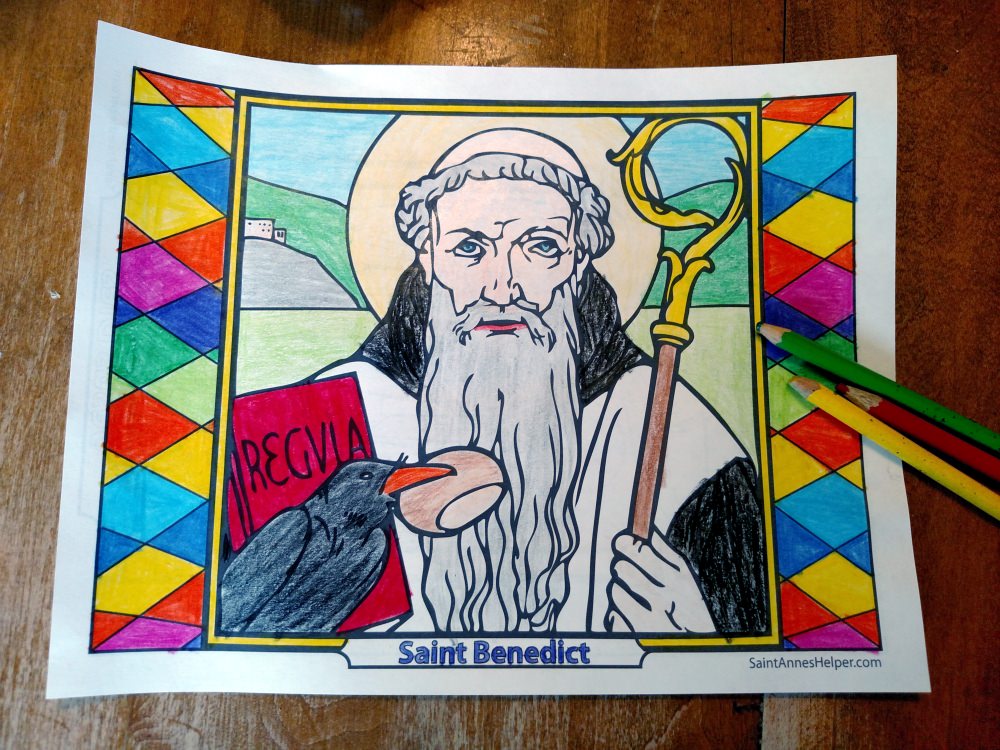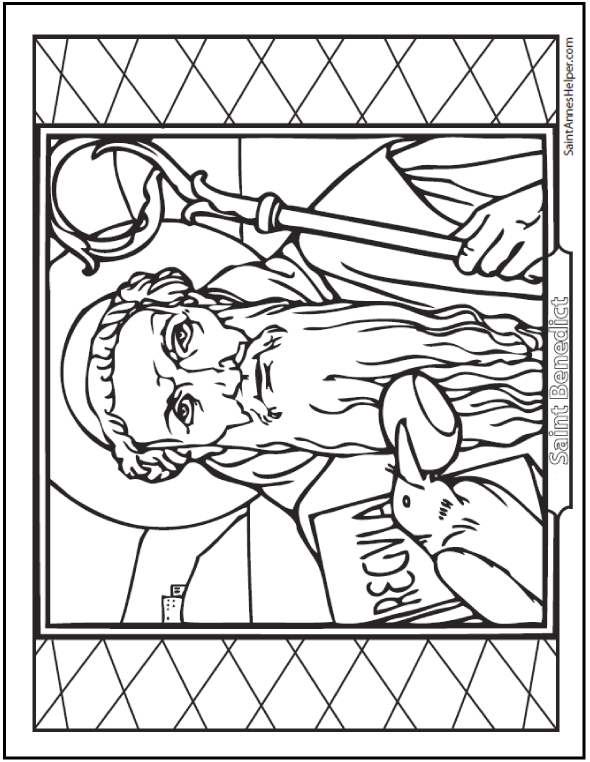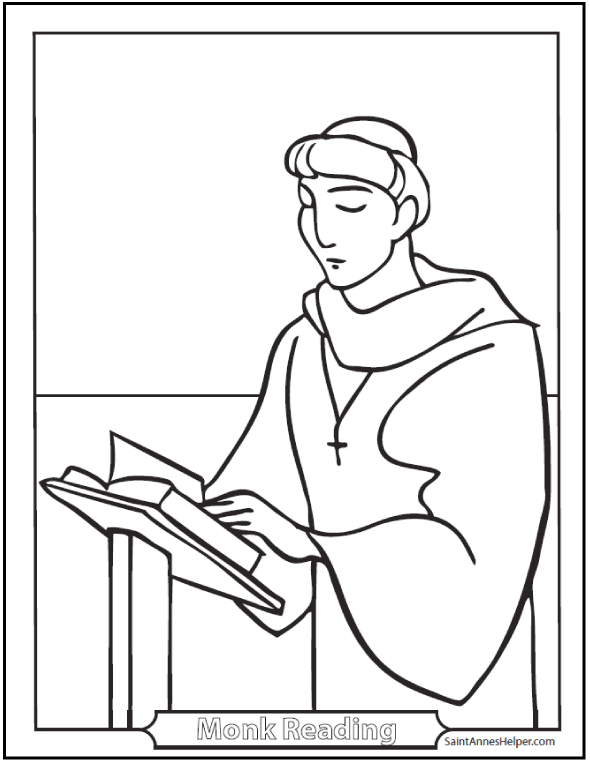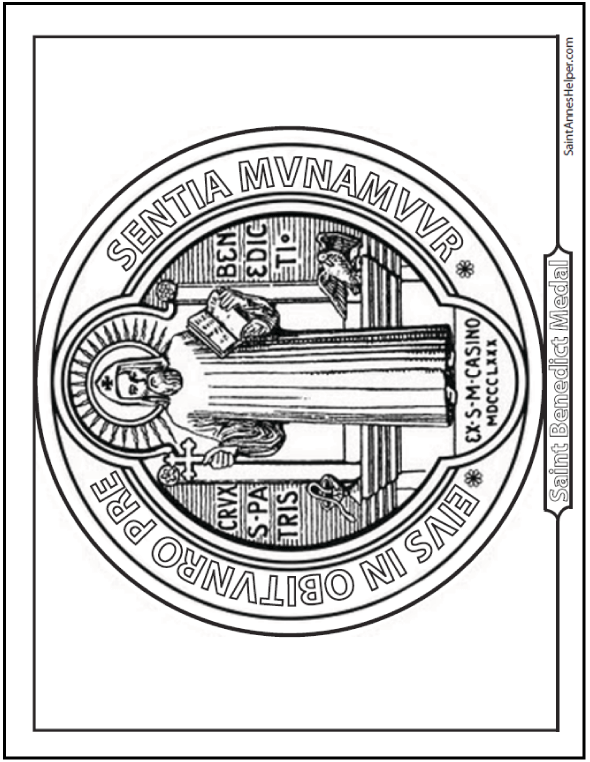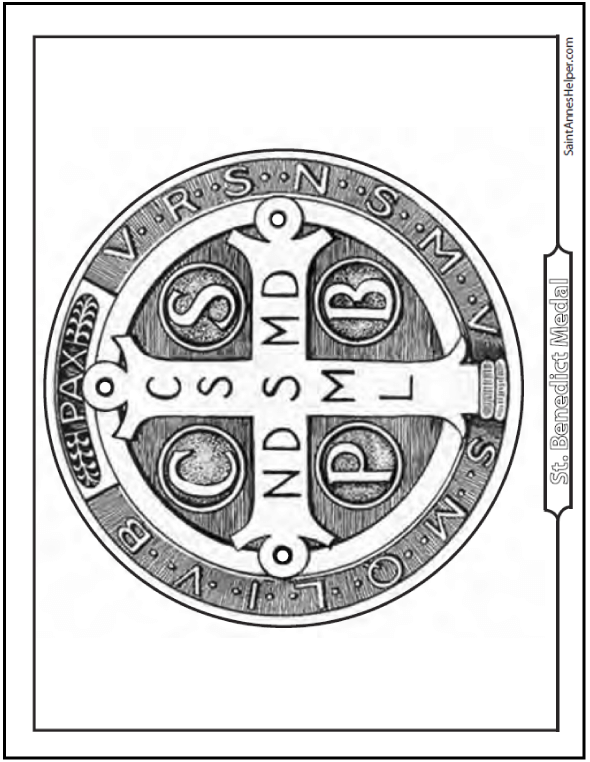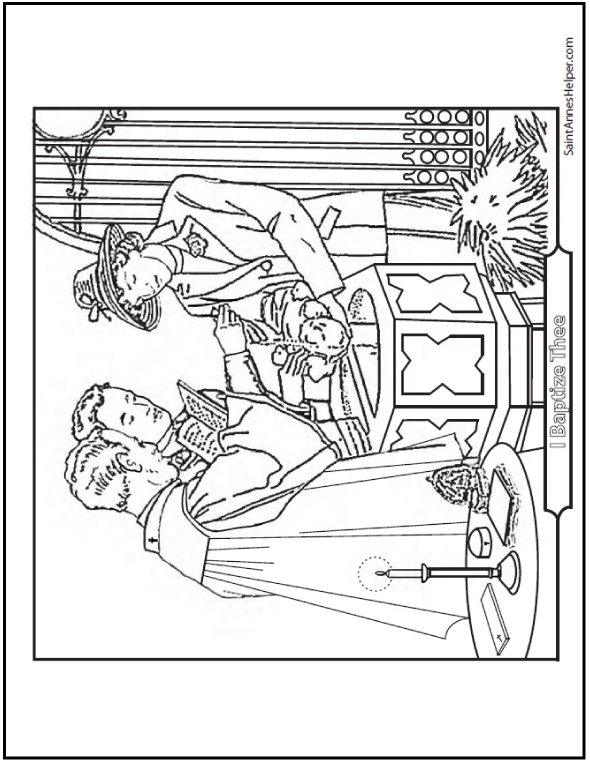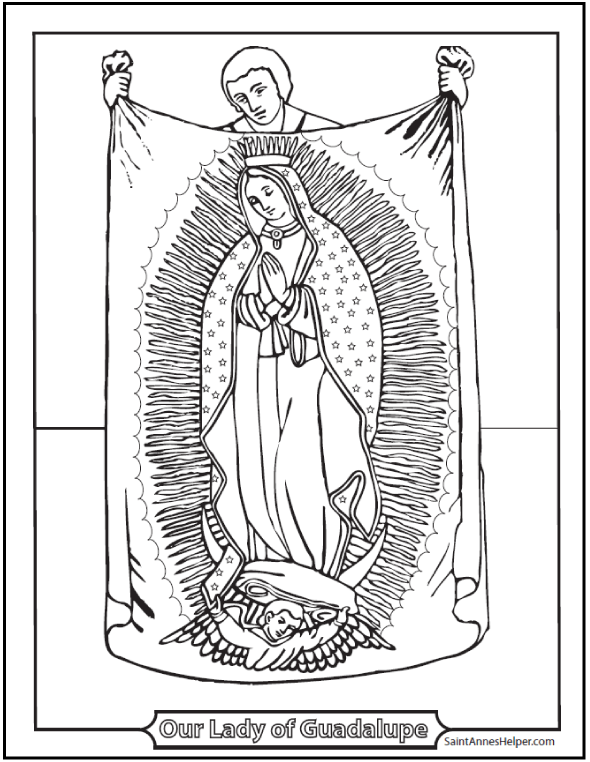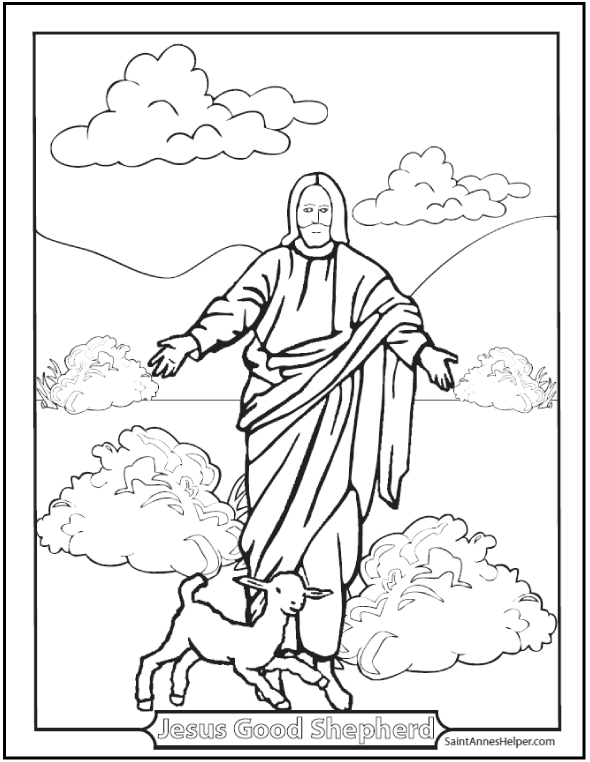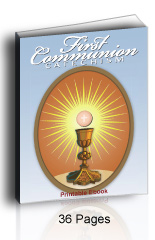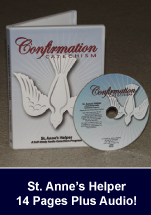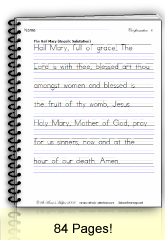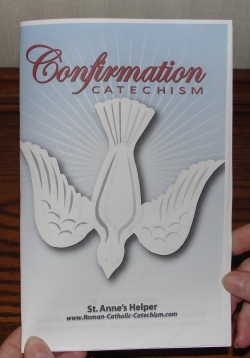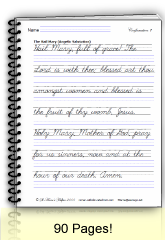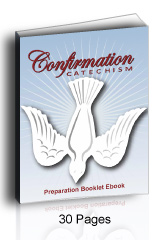- Home
- Coloring Pages To Print
- Saint Benedict Quotes
Saint Benedict Quotes And Medal of St. Benedict Coloring Pages
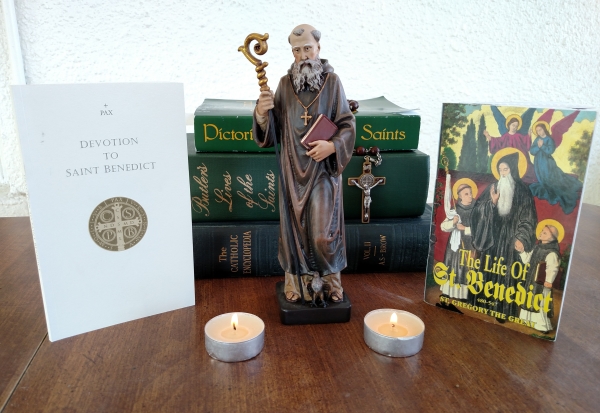 Saint Benedict quotes usually come from the Rule of St. Benedict or the story of his life as told by Pope St. Gregory the Great.
Saint Benedict quotes usually come from the Rule of St. Benedict or the story of his life as told by Pope St. Gregory the Great.Saint Benedict quotes usually come from the Rule of St. Benedict or from one of the stories of his life. Pope Saint Gregory the Great preserved most of what we know about his life as he had been a Benedictine monk before he was elected Pope. He had lived in the same areas and died less than fifty years later. This page has:
- Four St. Benedict coloring pages.
- A short story of the life of St. Benedict from the book Pictorial Lives of the Saints. This is a very nice version to read to little children or for children to read for themselves.
- Helpful Saint Benedict quotes from the Holy Rule: good works, obedience, silence, and humility.
- The lovely booklet, Life of St. Benedict, published by the old Tan Books is taken from the writings of Pope St. Gregory the Great, with a few notes from other historians, and a wonderful explanation of the Medal of St. Benedict with some prayers.
- The booklet Devotion to Saint Benedict has the Devotion of Ten Tuesdays in Honor of St. Benedict.
- The expanded story of St. Benedict is directly from Volume III: March of Rev. Alban Butler's Lives of the Saints which was published in 1866. Covers his life, vocation, trials, miracles, and death.
- The Lives of the Saints article includes a short explanation of Benedictine Spirituality.
- Saint Benedict, patron of a holy death.
1. Saint Benedict Coloring Pages
Celebrate St. Benedict's feast day, March 21, with a coloring page of him and both the front and back sides of his medal. These PDFs print to 8.5x11" single sided.
St. Benedict Of Nursia
Religious Monk Reading
Saint Benedict Medal Coloring Pages
Saint Benedict Medal: Front
Medal of St. Benedict: Back
Use the Baltimore Catechism?
Disclosure: I show products that I think will help you. If you use my links, I may earn ad commissions at no extra cost to you. As an Amazon Associate I earn from qualifying purchases.
2. Pictorial Lives March 21 - Saint Benedict, Abbot
St. BENEDICT, blessed by grace and in name, was born of a noble Italian family about 480. When a boy he was sent to Rome, and there placed in the public schools. Scared by the licentiousness of the Roman youth, he fled to the desert mountains of Subiaco, and was directed by the Holy Spirit into a cave, deep, craggy, and almost inaccessible. He lived there for three years, unknown to any one save the holy monk Romanus, who clothed him with the monastic habit and brought him food. But the fame of his sanctity soon gathered disciples round him.
The rigor of his rule, however, drew on him the hatred of some of the monks, and one of them mixed poison with the abbot's drink. But when the Saint made the Sign of the Cross on the poisoned bowl, it broke and fell in pieces to the ground.
After he had built twelve monasteries at Subiaco, he removed to Monte Cassino, where he founded an abbey in which he wrote his rule, and lived until death. By prayer he did all things: wrought miracles, saw visions, and prophesied.
A peasant, whose boy had just died, ran in anguish to St. Benedict, crying out, "Give me back my son!" The monks joined the poor man in his entreaties; but the Saint replied, "Such miracles are not for us to work, but for the blessed Apostles. Why will you lay upon me a burden which my weakness cannot bear?" Moved at length by compassion he knelt down, and prostrating himself upon the body of the child prayed earnestly. Then rising, he cried out, "Behold not, O Lord, my sins, but the faith of this man, who desireth the life of his son, and restore to the body that soul which Thou hast taken away." Hardly had he spoken when the child's body began to tremble, and taking it by the hand he restored it alive to its father.
Six days before his death he ordered his grave to be opened, and fell ill of a fever. On the sixth day he requested to be borne into the chapel, and, having received the Body and Blood of Christ, with hands uplifted, and leaning on one of his disciples, he calmly expired in prayer on the 21st of March, 543.
REFLECTION. The Saints never feared to undertake any work, however arduous, for God, because distrusting self they relied for assistance and support wholly upon prayer.
Pictorial Lives of the Saints, with Reflections for Every Day in the Year. Imprimatur 1878. Includes several Saint Benedict quotes.
Disclosure: I show products that I think will help you. If you use my links, I may earn ad commissions at no extra cost to you. As an Amazon Associate I earn from qualifying purchases.
Pictorial Lives Of The Saints Stories
From Pictorial Lives of the Saints, with Reflections for Every Day in the Year (Amazon), from Butler's Lives. Imprimatur, 1878.
Disclosure: I show products that I think will help you. If you use my links, I may earn ad commissions at no extra cost to you. As an Amazon Associate I earn from qualifying purchases.
Buy Our Saint Anne's Helper Ad-free PDF Catholic Coloring Pages to Print
Over 200 Catholic digital pictures to print.
Bonus: Christmas, Easter, animals, patriotic and more! Catholic Coloring Book Download. Ad-free PDF.
If you use the Baltimore Catechism, you'll love Saint Anne's Helper!
3. Saint Benedict Quotes From The Holy Rule
The Rule of St. Benedict is simple and clear. It begins with basically the Golden Rule and the Ten Commandments and continues through the Works of Mercy and other virtues.
It is a concise book that is practically not much more than seventy-two lessons which must be repeated through the year when one is reading St. Benedict's Rule daily. Even though it is meant for Benedictines or those in monasteries and convents, you will find that almost all of it is good advice to parents and teachers.
It promotes the supernatural virtues of faith, hope, and charity in humble obedience to the Rule for everyday life.
3.A. Saint Benedict Quotes Chapter 4 On Good Works
The instruments of good works:
- 1. First of all, to love the Lord thy God with all thy heart, with all thy soul, and with all thy strength.
- 2. Then, to love thy neighbor as thyself.
- 3. Next, not to kill.
- 4. Not to commit adultery.
- 5. Not to steal.
- 6. Not to covet.
- 7. Not to bear false witness.
- 8. To honor all men.
- 9. Not to do to another what one would not have done to oneself.
- 10. To deny oneself in order to follow Christ.
- 11. To chastise the body.
- 12. Not to seek after luxuries.
Here are some of my favorites:
- 42. To attribute any good one sees in oneself to God and not to oneself.
- 43. But always to acknowledge that the evil is one's own, and to attribute it to oneself.
- 44. To fear the days of judgment.
- 45. To be in dread of hell.
These are great advice to our children as they advance in wisdom, age, and grace.
- 53. Not to speak words that are vain or such as provoke laughter.
These make a great conclusion to this list of good works and show the charity of the Rule of Saint Benedict:
- 62. To fulfill the commandments of God daily by one's deeds.
- 63. To love chastity.
- 64. To hate no man.
- 65. To have no jealousy or envy.
- 66. Not to love strife.
- 67. To fly from vainglory.
- 68. To reverence one's seniors.
- 69. To love one's juniors.
- 70. To pray for one's enemies in the love of Christ.
- 71. To make peace with those with whom one is at variance before the setting of the sun.
- 72. And never to despair of God's mercy.
3.B. Saint Benedict Quotes On Obedience
- THE first degree of humility is obedience without delay.
- It is of these that the Lord said: "At the hearing of the ear they have obeyed Me." And again to teachers He says: "He that hears you hears Me."
- Such as these, without doubt, fulfill that saying of the Lord: I came "not to do My own will, but the will of Him Who sent Me."
- And this obedience ought to be given by the disciple with a ready will, because "God loves a cheerful giver."
3.C. Saint Benedict Quotes On Silence
- Here the prophet shows that if we ought at times for the sake of silence to refrain even from good words, much more ought we to abstain from evil words on account of the punishment due to sin.
- For to speak and to teach are the province of the master; whereas that of the disciple is to be silent and to listen.
3.D. Saint Benedict Quotes On Humility
- THE Sacred Scripture cries out to us, brethren, saying, "Everyone who exalts himself shall be humbled and he who humbles himself shall be exalted." In saying this it teaches us that all exaltation is of the nature of pride, which vice the Prophet shows that he took care to avoid….
- We descend by exaltation and ascend by humility.
- The first degree of humility, then, is that a person, always keeping the fear of God before his eyes, should avoid with the utmost care all forgetfulness, and be ever mindful of all that God has commanded.
- We are indeed forbidden to do our own will by the Scripture when it says to us: "Turn away from thy own will." And so, too, we beg of God in prayer that His will may be done in us.
- The second degree of humility is, that a person, loving not his own will, delight not in gratifying his desires, but carry out in his deeds that saying of the Lord: I came "not to do My own will, but the will of Him Who sent Me."
- The third degree of humility is, that a person for the love of God submit himself to his superior in all obedience, imitating thereby the Lord, of Whom the Apostle says: He became "obedient to death."
- The fourth degree of humility is, that if, in this very obedience, hard and contrary things, nay even injuries, are done to a person, he should take hold silently on patience, and, bearing up bravely, grow not weary nor depart, according to that saying of the Scripture: "He who has persevered to the end shall be saved." And again: "Let thy heart be strengthened and wait thou for the Lord."
There are twelve degrees of humility in the Rule of St. Benedict.
4. The Life of St. Benedict Booklet
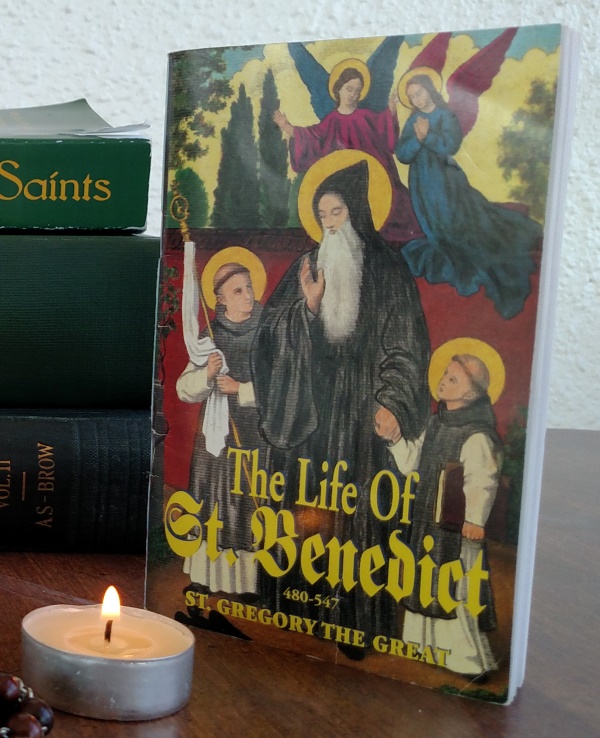 Life of Saint Benedict, Tan Books
Life of Saint Benedict, Tan BooksThe lovely booklet, The Life of St. Benedict (480-547), published by Tan Books is taken from the writings of Pope St. Gregory the Great, with a few notes from other historians, and a wonderful explanation of the Medal of St. Benedict with some prayers and many Saint Benedict quotes.
5. Devotion to Saint Benedict Booklet
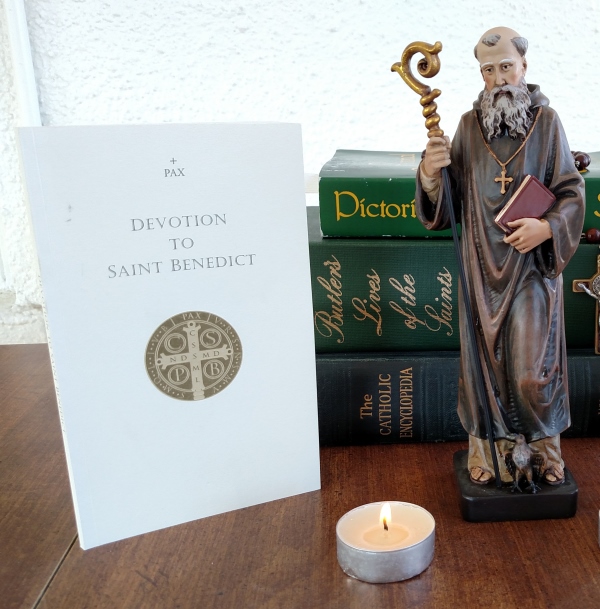 Devotion To Saint Benedict, Novena Booklet
Devotion To Saint Benedict, Novena BookletThe booklet Devotion to Saint Benedict has the Devotion of Ten Tuesdays in Honor of St. Benedict from the St. Benedict's Manual originally published in 1875 with explicit recommendation from Pope Pius IX.
This devotion may also be "practiced on the ten days that immediately precede it, beginning on the Feast of St. Gregory the Great (March 12), and ending on the Feast itself (March 21)." You can order it from Our Lady of Guadalupe Monastery.
6. Saint Benedict Quotes: Butler's Lives of the Saints
The following story comes from Butler's Lives of the Saints, 1866 and gives an exhaustive story. It is not from the re-written Thurston or Attwater versions of the early and mid 1900s. We find the older version of Butler's Lives to be more credible than the revisions.
6.A. Early Life Of Saint Benedict
Here is the life of St. Benedict as per Rev. Alban Butler's book Lives of the Saints. We read to check that Bartleby's version compares to the print version published Sarto Books, 1982. The only edits made were to use the American spelling as in the Sarto Book version and to add subtitles and paragraphs for easier online reading. The online Bartleby version has very helpful links to the notes and back links to the text.
- From St. Gregory, (Dial. l. 2. c. 1.) who assures us that he received his account of this saint from four abbots, the saint’s disciples; namely, Constantine, his successor at Monte Cassino, Simplicius, third abbot of that house, Valentinian, the first abbot of the monastery of Lateran, and Honoratus, who succeeded St. Benedict at Subiaco. See the remarks of Mabillon, Annal. Ben. l. 1. p. 3. and l. 2. p. 38. and Act. Sanct. Bened. t. 1. p. 80. Also Dom. Mege, Vie de Saint Benoît, avec une Histoire Abregée de son Ordre, in 4to. An. 1690. Hæften’s Disquisitions, and abbot Steingelt’s abridgment of the same, and Ziegelbauer and Legipont, Historia Literaria Ord. S. Benedicti, An. 1754. t. 1. p. 3. and principally t. 3. p. 2.
A.D. 543.
[Patriarch of the Western Monks.] SAINT BENEDICT, or BENNET, was a native of Norcia, formerly an episcopal see in Umbria, and was descended from a family of note, and born about the year 480. The name of his father was Eutropius, and that of his grandfather, Justinian.
When he was fit for the higher studies, he was sent by his parents to Rome, and there placed in the public schools. He, who till that time knew not what vice was, and trembled at the shadow of sin, was not a little shocked at the licentiousness which he observed in the conduct of some of the Roman youth, with whom he was obliged to converse; and he had no sooner come into the world, but he resolved to bid an eternal farewell to it, and not to be entangled in its snares. He therefore left the city privately, and made the best of his way towards the deserts.
His nurse, Cyrilla, who loved him tenderly, followed him as far as Afilum, thirty miles from Rome, where he found means to get rid of her, and pursued his journey alone to the desert mountain of Sublacum, 1 near forty miles from Rome. It is a barren, hideous, chain of rocks, with a river and lake in the valley.
Near this place the saint met a monk of a neighbouring monastery, called Romanus, who gave him the monastic habit, with suitable instructions, and conducted him to a deep narrow cave in the midst of these mountains, almost inaccessible to men. In this cavern, now called the Holy Grotto, the young hermit chose his abode: and Romanus, who kept his secret, brought him hither, from time to time, bread and the like slender provisions, which he retrenched from his own meals, and let them down to the holy recluse with a line, hanging a bell to the cord to give him notice.
Bennet seems to have been about fourteen or fifteen years old when he came to Sublacum; St. Gregory says, he was yet a child. He lived three years in this manner known only to Romanus. But God was pleased to manifest his servant to men, that he might shine forth as a light to many.
6.B. Saint Benedict's Vocation
In 497, a certain pious priest in that country, whilst he was preparing a dinner for himself on Easter-Sunday, heard a voice which said: “You are preparing for yourself a banquet, whilst my servant Bennet, at Sublacum, is distressed with hunger.” The priest immediately set out in quest of the hermit, and with much difficulty found him out.
Bennet was surprised to see a man come to him; but before he would enter into conversation with him, he desired they might pray together. They then discoursed for some time on God and heavenly things. At length the priest invited the saint to eat, saying, it was Easter-day, on which it is not reasonable to fast; though St. Bennet answered him, that he knew not that it was the day of so great a solemnity, nor is it to be wondered at, that one so young should not be acquainted with the day of a festival, which was not then observed by all on the same day, or that he should not understand the Lunar Cicle, which at that time was known by very few.
After their repast the priest returned home. Soon after certain shepherds discovered the saint near his cave, but at first took him for a wild beast; for he was clad with the skins of beasts, and they imagined no human creature could live among those rocks. When they found him to be a servant of God, they respected him exceedingly, and many of them were moved by his heavenly discourses to embrace with fervour a course of perfection. From that time he began to be known, and many visited him, and brought him such sustenance as he would accept: in requital for which he nourished their souls with spiritual instructions.
6.C. Trial Of St. Benedict
Though he lived sequestered from the world, he was not yet secure from the assaults of the tempter. Wherever we fly the devil still pursues us, and we carry a domestic enemy within our own breasts. St. Gregory relates that whilst St. Bennet was employed in divine contemplation, the fiend endeavoured to withdraw his mind from heavenly objects, by appearing in the shape of a little black bird; but that, upon his making the sign of the cross, the phantom vanished.
After this, by the artifices of this restless enemy, the remembrance of a woman whom the saint had formerly seen at Rome, occurred to his mind, and so strongly affected his imagination, that he was tempted to leave his desert. But blushing at so base a suggestion of the enemy, he threw himself upon some briers and nettles which grew in the place where he was, and rolled himself a long time in them till his body was covered with blood. The wounds of his body stifled all inordinate inclinations, and their smart extinguished the flame of concupiscence. This complete victory seemed to have perfectly subdued that enemy; for he found himself no more molested with its stings.
6.D. Life and Miracles of St. Benedict
The fame of his sanctity being spread abroad, it occasioned several to forsake the world, and imitate his penitential manner of life. Some time after the monks of Vicovara, on the death of their abbot, pitched upon him to succeed him. He was very unwilling to take upon himself that charge, which he declined in the spirit of sincere humility, the beloved virtue which he had practised from his infancy, and which was the pleasure of his heart, and is the delight of a God humbled even to the cross, for the love of us.
The saint soon found by experience that their manners did not square with his just idea of a monastic state. Certain sons of Belial among them carried their aversion so far as to mingle poison with his wine: but when, according to his custom, before he drank of it he made the sign of the cross over the glass, it broke as if a stone had fallen upon it. “God forgive you, brethren,” said the saint, with his usual meekness and tranquillity of soul, “you now see I was not mistaken when I told you that your manners and mine would not agree.”
He therefore returned to Sublacum; which desert he soon peopled with monks, for whom he built twelve monasteries, placing in each twelve monks with a superior. 3 In one of these twelve monasteries there lived a monk, who, out of sloth, neglected and loathed the holy exercise of mental prayer, insomuch that after the psalmody or divine office was finished, he every day left the church to go to work, whilst his brethren were employed in that holy exercise; for by this private prayer in the church, after the divine office, St. Gregory means pious meditation, as Dom. Mege demonstrates.
This slothful monk began to correct his fault upon the charitable admonition of Pompeian, his superior; but, after three days, relapsed into his former sloth. Pompeian acquainted Saint Benedict, who said, “I will go and correct him myself.” Such indeed was the danger and enormity of this fault, as to require the most effectual and speedy remedy. For it is only by assiduous prayer, that the soul is enriched with the abundance of the heavenly water of divine graces, which produces in her the plentiful fruit of all virtues.
If we consider the example of all the saints, we shall see that prayer was the principal means by which the Holy Ghost sanctified their souls, and that they advanced in perfection in proportion to their progress in the holy spirit of prayer. If this be neglected, the soul becomes spiritually barren, as a garden loses all its fruitfulness, and all its beauty, if the pump raise not up a continual supply of water, the principle of both.
St. Benedict, deploring the misfortune and blindness of this monk, hastened to his monastery, and coming to him at the end of the divine office, saw a little black boy leading him by the sleeve out of the church. After two days’ prayer, St. Maurus saw the same; but Pompeian could not see this vision, by which was represented that the devil studies to withdraw men from prayer, in order that, being disarmed and defenceless, they may easily be made a prey. On the third day, St. Benedict finding the monk still absent from church in the time of prayer, struck him with a wand, and by that correction the sinner was freed from the temptation.
Dom. German Millet, tells us, from the tradition and archives of the monastery of St. Scholastica, that this happened in St. Jerom’s. In the monastery of St. John, a fountain sprung up at the prayers of the saint; this, and two other monasteries, which were built on the summit of the mountain, being before much distressed for want of water.
In that of St. Clement, situate on the bank of a lake, a Goth, who was a monk, let fall the head of a sickle into the water as he was cutting down thistles and weeds in order to make a garden; but St. Maur, who with St. Placidus lived in that house, holding the wooden handle in the water, the iron of its own accord swam, and joined it again, as St. Gregory relates.
St. Benedict’s reputation drew the most illustrious personages from Rome and other remote parts to see him. Many, who came clad in purple, sparkling with gold and precious stones, charmed with the admirable sanctity of the servant of God, prostrated themselves at his feet to beg his blessing and prayers, and some, imitating the sacrifice of Abraham, placed their sons under his conduct in their most tender age, that they might be formed to perfect virtue from their childhood. Among others, two rich and most illustrious senators, Eutychius, or rather Equitius, and Tertullus, committed to his care their two sons, Maurus, then twelve years old, and Placidus, also a child, in 522.
The devil, envying so much good, stirred up his wicked instruments to disturb the tranquillity of the servant of God. Florentius, a priest in the neighbouring country, though unworthy to bear that sacred character, moved by a secret jealousy, persecuted the saint, and aspersed his reputation with grievous slanders. Bennet, being a true disciple of Christ, knew no revenge but that of meekness and silence: and not to inflame the envy of his adversary, left Sublacum, and repaired to Mount Cassino. He was not got far on his journey, when he heard that Florentius was killed by the fall of a gallery in which he was. The saint was much afflicted at his sudden and unhappy death, and enjoined Maurus a penance for calling it a deliverance from persecution.
Cassino is a small town, now in the kingdom of Naples, built on the brow of a very high mountain, on the top of which stood an old temple of Apollo, surrounded with a grove in which certain idolators still continued to offer their abominable sacrifices. The man of God having, by his preaching and miracles, converted many of them to the faith, broke the idol to pieces, overthrew the altar, demolished the temple and cut down the grove. Upon the ruins of which temple and altar he erected two oratories or chapels; one bore the name of St. John the Baptist, the other of St. Martin. This was the origin of the celebrated abbey of Mount Cassino, the foundation of which the saint laid in 529, the forty-eighth year of his age, the third of the emperor Justinian: Felix IV., being pope, Athalaric king of the Goths in Italy.
The patrician, Tertullus, came about that time to pay a visit to the saint, and to see his son Placidus; and made over to this monastery several lands which he possessed in that neighbourhood and also a considerable estate in Sicily. St. Bennet met on Mount Cassino, one Martin, a venerable old hermit, who, to confine himself to a more austere solitude, had chained himself to the ground in his cell, with a long iron chain. The holy abbot, fearing this singularity might be a mark of affectation, said to him: “if you are a servant of Jesus Christ, let the chain of his love, not one of iron, hold you fixed in your resolution.” Martin gave proof of his humility by his obedience, and immediately laid aside his chain.
Saint Bennet governed also a monastery of nuns, situate near Mount Cassino, as is mentioned by St. Gregory: he founded an abbey of men at Terracina, and sent St. Placidus into Sicily to establish another in that island. Though ignorant of secular learning, he was eminently replenished with the spirit of God, and an experimental science of spiritual things: on which account he is said by St. Gregory the Great to have been “learnedly ignorant and wisely unlettered.” For the alphabet of this great man is infinitely more desirable than all the empty science of the world, as St. Arsenius said of St. Antony.
From certain very ancient pictures of St. Benedict and old inscriptions, Mabillon proves this saint to have been in holy orders, and a deacon. Several moderns say he was a priest; but, as Muratori observes without grounds. By the account which St. Gregory has given us of his life, it appears that he preached sometimes in neighbouring places, and that a boundless charity opening his hand, he distributed amongst the needy all that he had on earth, to lay up his whole treasure in heaven, St. Bennet, possessing perfectly the science of the saints, and being enabled by the Holy Ghost to be the guide of innumerable souls in the most sublime paths of Christian perfection, compiled a monastic rule, which, for wisdom and discretion, St. Gregory the Great preferred to all other rules; and which was afterwards adopted, for some time, by all the monks of the West. It is principally founded on silence, solitude, prayer, humility, and obedience.
St. Bennet calls his Order a school in which men learn how to serve God: and his life was to his disciples a perfect model for their imitation, and a transcript of his rule. Being chosen by God, like another Moses, to conduct faithful souls into the true promised land, the kingdom of heaven, he was enriched with eminent supernatural gifts, even those of miracles and prophecy.
He seemed, like another Eliseus, endued by God with an extraordinary power, commanding all nature; and like the ancient prophets, foreseeing future events. He often raised the sinking courage of his monks, and baffled the various artifices of the devil with the sign of the cross, rendered the heaviest stone light, in building his monastery by a short prayer, and, in presence of a multitude of people, raised to life a novice who had been crushed by the fall of a wall at Mount Cassino.
He foretold, with many tears, that this monastery should be profaned and destroyed; which happened forty years after, when the Lombards demolished it about the year 580. He added, that he had scarcely been able to obtain of God that the inhabitants should be saved. It was strictly forbidden by the rule of St. Benedict, for any monk to eat out of his monastery, unless he was at such a distance that he could not return home that day, and this rule, says St. Gregory, was inviolably observed.
Indeed nothing more dangerously engages monks in the commerce of the world; nothing more enervates in them the discipline of abstinence and mortification, than for them to eat and drink with seculars abroad. St. Gregory tells us, that St. Bennet knew by revelation the fault of one of his monks who had accepted of an invitation to take some refreshment when he was abroad on business.
A messenger who brought the saint a present of two bottles of wine, and had hid one of them, was put in mind by him to beware drinking of the other, in which he afterwards found a serpent. One of the monks, after preaching to the nuns, had accepted of some handkerchiefs from them, which he hid in his bosom; but the saint, upon his return, reproved him, for his secret sin against the rule of holy poverty. A novice, standing before him, was tempted with thoughts of pride on account of his birth: the saint discovered what passed in his soul and bid him make the sign of the cross….
When Belisarius, the emperor’s general, was recalled to Constantinople, Totila, the Arian king of the Goths, invaded and plundered Italy. Having heard wonders of the sanctity of St. Bennet, and of his predictions and miracles, he resolved to try whether he was really that wonderful man which he was reported to be. Therefore, as he marched through Campania, in 542, he sent the man of God word, that he would pay him a visit. But instead of going in person he dressed one of his courtiers, named Riggo, in his royal purple robes, and sent him to the monastery, attended by the three principal lords of his court, and a numerous train of pages. St. Bennet, who was then sitting, saw him coming to his cell, and cried out to him at some distance: “Put off, my son, those robes which you wear, and which belong not to you.”
The mock king, being struck with a panic for having attempted to impose upon the man of God, fell prostrate at his feet, together with all his attendants. The saint, coming up, raised him with his hand; and the officer returning to his master, related trembling what had befallen him. The king then went himself, but had no sooner come into the presence of the holy abbot, but he threw himself on the ground and continued prostrate till the saint, going to him, obliged him to rise.
The holy man severely reproved him for the outrages he had committed, and said: “You do a great deal of mischief, and I foresee you will do more. You will take Rome: you will cross the sea, and will reign nine years longer: but death will overtake you in the tenth, when you shall be arraigned before a just God to give an account of your conduct.” All which came to pass as St. Benedict had foretold him.
Totila was seized with fear, and recommended himself to his prayers. From that day the tyrant became more humane; and when he took Naples, shortly after, treated the captives with greater lenity than could be expected from an enemy and a barbarian. When the bishop of Canusa afterwards said to the saint, that Totila would leave Rome a heap of stones, and that it would be no longer inhabited, he answered: “No: but it shall be beaten with storms and earthquakes, and shall be like a tree which withers by the decay of its root.” Which prediction St. Gregory observes to have been accomplished.
6.E. Death Of Saint Benedict
The death of this great saint seems to have happened soon after that of his sister St. Scholastica, and in the year after his interview with Totila. He foretold it to his disciples, and caused his grave to be opened six days before. When this was done he fell ill of a fever, and on the sixth day would be carried into the chapel, where he received the body and blood of our Lord, and having given his last instructions to his sorrowful disciples, standing, and leaning on one of them, with his hands lifted up, he calmly expired, in prayer, on Saturday, the 21st of March, probably in the year 543, and of his age the sixty-third; having spent fourteen years at Mount Cassino.
The greater part of his relics remains still in that abbey; though some of his bones were brought into France, about the close of the seventh century, and deposited in the famous abbey of Fleury, which, on that account, has long born the name of St. Bennet’s on the Loire. It was founded in the reign of Clovis II. about the year 640, and belongs at present to the congregation of St. Maur.
7. Benedictine Spirituality
St. Gregory, in two words, expresses the characteristical virtue of this glorious patriarch of the monastic Order, when he says, that, returning from Vicovara to Sublaco, he dwelt alone with himself; which words comprise a great and rare perfection, in which consists the essence of holy retirement. A soul dwells not in true solitude, unless this be interior as well as exterior, and unless she cultivate no acquaintance but with God and herself, admitting no other company.
Many dwell in monasteries, or alone, without possessing the secret of living with themselves. Though they are removed from the conversation of the world, their minds still rove abroad wandering from the consideration of God and themselves, and dissipated amidst a thousand exterior objects which their imagination presents to them, and which they suffer to captivate their hearts, and miserably entangle their will with vain attachments and foolish desires.
Interior solitude requires the silence of the interior faculties of the soul, no less than of the tongue and exterior senses: without this, the inclosure of walls is a very weak fence. In this interior solitude, the soul collects all her faculties within herself, employs all her thoughts on herself and on God, and all her strength and affections in aspiring after him. Thus, St. Benedict dwelt with himself, being always busied in the presence of his Creator, in bewailing the spiritual miseries of his soul and past sins, in examining into the disorders of his affections, in watching over his senses, and the motions of his heart, and in a constant attention to the perfection of his state, and the contemplation of divine things.
This last occupied his soul in the sweet exercises of divine love and praise; but the first mentioned exercises, or the consideration of himself and of his own nothingness and miseries, laid the foundation by improving in him continually the most profound spirit of humility and compunction.
The twelve degrees of humility, which he lays down in his Rule, are commended by St. Thomas Aquinas.
Excellent Saint Benedict quotes:
- The first is a deep compunction of heart, and holy fear of God and his judgments, with a constant attention to walk in the divine presence, sunk under the weight of this confusion and fear.
- The perfect renunciation of our own will.
- Ready obedience.
- Patience under all sufferings and injuries.
- The manifestation of our thoughts and designs to our superior or director.
- To be content, and to rejoice, in all humiliations; to be pleased with mean employments, poor clothes, &c. to love simplicity and poverty, (which he will have among monks, to be extended even to the ornaments of the altar,) and to judge ourselves unworthy, and bad servants in every thing that is enjoined us.
- Sincerely to esteem ourselves baser and more unworthy than every one, even the greatest sinners.
- To avoid all love of singularity in words or actions.
- To love and practice silence.
- To avoid dissolute mirth and loud laughter.
- Never to speak with a loud voice, and to be modest in our words.
- To be humble in all our exterior actions, by keeping our eyes humbly cast down with the publican, and the penitent Manasses.
St. Benedict adds, that divine love is the sublime recompense of sincere humility, and promises, upon the warrant of the divine word, that God will raise that soul to perfect charity, which, faithfully walking in these twelve degrees, shall have happily learned true humility. Elsewhere he calls obedience with delay the first degree of humility, but means the first among the exterior degrees; for he places before it interior compunction of soul, and the renunciation of our own will.
8. Saint Benedict Patron Of A Happy Death
Saint Benedict is a patron of a happy death and is "a most powerful intercessor at the last hour". (Life of St. Benedict, Tan Books)
Are you named Benedict? Is your school named St. Benedict school or St. Benedict College? If so, St. Benedict is one of your patron saints.
The same is true if you live on St. Benedict Street, or live in a town called St. Benedict. I'm there's a special place in Heaven for any place named after him, especially Saint Benedict Hospital.
Remember to ask him to pray for you.
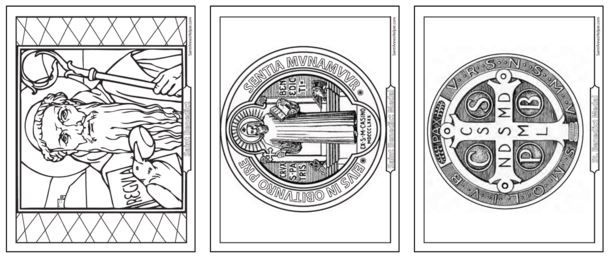 See the top of this page for three Saint Benedict coloring pages, quotes, and stories. There is also a coloring page of a monk who could be a Benedictine.
See the top of this page for three Saint Benedict coloring pages, quotes, and stories. There is also a coloring page of a monk who could be a Benedictine.Sources
Butler's Lives of the Saints (1866)
Pictorial Lives of the Saints, with Reflections for Every Day in the Year, compiled from Butler's Lives and other Approved Sources. Imprimatur, 1878.
Notes from Rev. Alban Butler's Lives of the Saints (1866) have been compared to Butler's Lives of the Saints, Sarto Books, 1982 (NOT Thurston's or Attwater's rewrites).
Catholic Encyclopedia, 1918.
Roman Catholic Bible Quotes
Roman Catholic Bible Online (Douay-Rheims Bible) quotes have been compared to the hard bound Douay-Rheims Bible, Tan Books.
A Catholic Missal concurs with the Vulgate version of the Roman Catholic Bible so that the daily readings for a saint's feast would be good to read (For example: St. Andrew Missal by Angelus Press, Baronius, St. Bonaventure Publications, and Fr. Lasance).
The Mass of Saint Benedict
Feast: March 21
Mass "Os Justi...."
Introit Psalm 36:30-31
Epistle Wisdom 45:1-6
Gospel Matthew 19:27-29
Offertory Psalm 20:3-4
Communion Luke 12:42
Saint Benedict Prayer:
St. Benedict, pray for us.
Thank you for visiting our Saint Benedict quotes and coloring pages.
See More Catholic Coloring Pages
Catholic Sacraments And Coloring Pages
New Catholic Picture Bible Stories
Little ones love when you use the New Catholic Picture Bible like a photo album.
Share the Bible stories as if they are stories from your own life because they are. God wants to be part of our every day lives. :-)
Buy this picture Bible at Amazon.
Catholic Saints Coloring Pages
Bible Story Coloring Pages
Audio Baltimore Catechism, Catholic Worksheets, Catholic eBooks, and Catholic Coloring Pages:
Catholic catechism resources for your Roman Catholic catechism class, Faith formation, Catholic homeschool, religious education, or Sunday school lessons. Save on bundles!
Order our Baltimore Catechism worksheets. Choose your favorite fonts, colors, and SIZES on our fillable digital interactive worksheets and coloring pages. Paperless or printable.
First Communion Preparation Baltimore Catechism No. 1 For Children And Adults - Or get the bundle.
Baltimore Catechism Communion single or bundled downloads: audio, ebooklet, and digital worksheets for kids and adults. Verbatim text in all formats.
